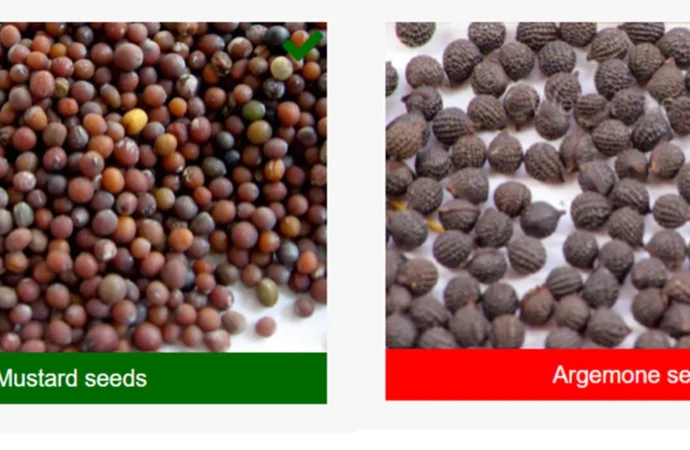Report
Mustard seeds, rich in essential vitamins and minerals, are a staple in Indian cooking, especially for tempering dishes. Known for their digestive and heart-health benefits, these tiny seeds pack a powerful nutritional punch. However, growing concerns have emerged about their safety, as recent reports indicate increasing cases of adulteration with harmful argemone seeds.
What Are Argemone Seeds and Why Are They Dangerous?
Argemone seeds come from the Argemone mexicana plant, commonly known as Mexican poppy. These small, black seeds closely resemble mustard seeds in size and colour, making them difficult to detect. Since they mature and are harvested alongside mustard crops, they are often unintentionally—or sometimes deliberately—mixed into mustard seeds or mustard oil. Though they may look harmless, argemone seeds are highly toxic. They contain poisonous alkaloids such as sanguinarine and dehydrosanguinarine, which can cause epidemic dropsy—a serious and potentially fatal condition. This illness is characterised by:
-
Increased capillary permeability
-
Swelling (oedema) in the lower limbs and body
-
Oxidative stress
-
Destruction of red blood cells, leading to anaemia
-
Congestive heart failure (in severe cases)
According to a study by the National Library of Medicine, argemone seeds contain 30–35% oil, with about 0.13% consisting of these toxic alkaloids. Adulteration of mustard products with argemone seeds remains a significant food safety concern in India, especially during the mustard harvesting season, underscoring the need for careful inspection of spices and oils.
How to Test Mustard Seeds for Argemone Adulteration
Here’s a quick and easy method to check if your mustard seeds are adulterated with argemone:
-
Spread a small quantity of mustard seeds on a clean glass plate.
-
Closely inspect the seeds under good lighting.
-
Pure ones will have a smooth outer surface.
-
Adulterated seeds containing argemone will appear blackish with a rough, grainy texture.
Stay Informed and Safe
The Food Safety and Standards Authority of India (FSSAI) launched the #DetectingFoodAdulterants campaign as part of its broader effort to promote food safety awareness. While the campaign began a few years ago, FSSAI continues to share educational content and simple home-testing tips through social media and public outreach. Consumers are encouraged to use these resources to check everyday ingredients like mustard seeds, mustard oil, rice, sugar, and spices for common adulterants.
Source: The Times of India
 Food Manifest
Food Manifest 


















